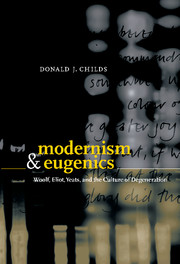Book contents
- Frontmatter
- Contents
- Introduction
- Chapter 1 Virginia Woolf's hereditary taint
- Chapter 2 Boers, whores, and Mongols in Mrs. Dalloway
- Chapter 3 Body and biology in A Room of One's Own
- Chapter 4 Eliot on biology and birthrates
- Chapter 5 To breed or not to breed: the Eliots' question
- Chapter 6 Fatal fertility in The Waste Land
- Chapter 7 The late eugenics of W.B. Yeats
- Chapter 8 Yeats and stirpiculture
- Chapter 9 Yeats and The Sexual Question
- Notes
- Index
Chapter 4 - Eliot on biology and birthrates
Published online by Cambridge University Press: 22 September 2009
- Frontmatter
- Contents
- Introduction
- Chapter 1 Virginia Woolf's hereditary taint
- Chapter 2 Boers, whores, and Mongols in Mrs. Dalloway
- Chapter 3 Body and biology in A Room of One's Own
- Chapter 4 Eliot on biology and birthrates
- Chapter 5 To breed or not to breed: the Eliots' question
- Chapter 6 Fatal fertility in The Waste Land
- Chapter 7 The late eugenics of W.B. Yeats
- Chapter 8 Yeats and stirpiculture
- Chapter 9 Yeats and The Sexual Question
- Notes
- Index
Summary
In The Idea of a Christian Society (1939), T. S. Eliot's recollection of the early years of the eugenics movement allows him to identify the permanent value of a “Liberalism” that he otherwise despises. Liberalism is a negative ideology, aspiring to negate abusive, obsolete, unreasonable restraints upon the individual. The problem is that “as its movement is controlled rather by its origin than by any goal, it loses its force after a series of rejections, and with nothing to destroy is left with nothing to uphold and with nowhere to go.” Welcoming the passing of Liberalism, Eliot nevertheless warns against confusing the chaos that Liberalism causes with the “necessary negative element” that it represents. The danger is that the baby will be thrown out with the bathwater should Liberalism “come to signify for us only the disorder the fruits of which we inherit, and not the permanent value of the negative element.” Thus “Out of Liberalism itself come philosophies which deny it,” and so “Liberalism can prepare the way for that which is its own negation: the artificial, mechanised or brutalised control which is a desperate remedy for its chaos.” Totalitarianism is one such control; eugenical legislation is another.
As an example of an intrusion upon “the preserves of ‘private life’” that even those “most convinced of the necessity of étatisme as a control of some activities of life” would reject, Eliot describes the following scenario: “It is possible that a wave of terror of the consequences of depopulation might lead to legislation having the effect of compulsory breeding.”
- Type
- Chapter
- Information
- Modernism and EugenicsWoolf, Eliot, Yeats, and the Culture of Degeneration, pp. 75 - 98Publisher: Cambridge University PressPrint publication year: 2001

